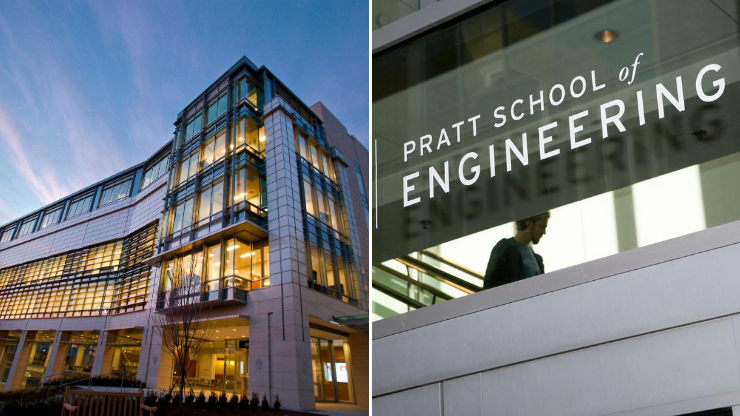
This article was first published by Duke MEDx
Duke medical students Jess Rames and Daniel Cox have been chosen as the newest recipients of MEDx’s Barr-Spach Medicine and Engineering Scholarship.
The scholarship will support the pair as they complete a Master of Engineering degree through the Pratt School’s innovative Doctor of Medicine-Master of Engineering (MD-MEng) dual degree program.
Engineering has rapidly changed the medical field in recent years, from the types of medical interventions offered to the way medicine is practiced. “With formal engineering training through the MD-MEng program, Duke medical students are better equipped to serve as translators between the two disciplines,” says Donna Crenshaw, executive director of MEDx.
“The value of combining these degrees,” says Brad Fox, program director and associate dean for master’s programs at the Pratt School of Engineering, “is that it provides additional knowledge and understanding to help graduates design novel solutions to complex medical problems using engineering solutions.”
The scholarship was created as a gift from Maynard Ramsey III, M/69, G’75, who established an endowment to honor his Duke mentors, biomedical engineering professor and associate professor of pediatrics Roger C. Barr and pediatric cardiologist Madison S. Spach.
Training Two
Rames and Cox are the second class of scholars to pursue the MD-MEng dual degree option with the Barr-Spach scholarship and the first class to include two students simultaneously.
“The MD-MEng trainees will not only be well-versed in clinical and population-health challenges, but they will also be integrated into and speak the language of the engineering community, which will work to provide solutions to these challenges,” adds Geoff Ginsburg, MEDx director.
The program is a signature example of the kinds of interdisciplinary training opportunities that MEDx seeks to foster.
“MEDx aims to create innovation at the interface of medicine and engineering, and the MD-MEng program lays the groundwork for developing the next generation of researchers who will be more prepared to carry out cross-disciplinary research and lead programs at this nexus,” Ginsburg says. “We’re excited to support two scholars this year as they embark on this less conventional career path as Barr-Spach Scholars.”
Hands-On Training
 Jess Rames
Jess RamesRames, who starts his Master of Engineering this semester, has been excited about this journey for a while now.
“The reason I went into medicine is my love for science and engineering,” says Rames. During his undergraduate years he worked in a tissue engineering lab and fell in love with the creative aspect of problem solving that came with being in an engineering space. “After that experience, the intersection of medicine and engineering was something I knew I needed to pursue in my career, and I was determined to find a way to do it.”
A third-year medical student at Duke, Rames says a major reason he applied to Duke was because of the MD-MEng program. “After looking at different programs around the country, I came across this one and thought ‘this is exactly what I want’ because it’s the perfect timeline and fits my desires for my career.”
Rames – who holds a bachelor’s degree in both biochemistry and genetics from Clemson University – is optimistic that the MD-MEng degree will give him the foundation he needs to forge his career as a practicing physician with an engineering background.
“Having the capacity to understand how the tools I will use in the operating room are manufactured and the logistical aspect of making an idea actually happen excites me,” said Rames. “Ultimately, my plan is to practice medicine while also devoting time to innovation and development and creating new technologies that I can use in my practice.”
The MD-MEng program doesn’t have a preset path for its students, but Rames finds that beneficial. “I can really make out of this program what I want. The program may not go exactly as I planned, but that’s kind of the point.”
Bridging the Gap
 Daniel Cox
Daniel CoxCox also begins his Master of Engineering this semester and is excited about the opportunity that lies ahead.
“Growing up, I worked on a farm and enjoyed the tinkering aspect of it so much so that I considered an undergraduate degree in engineering – but my school didn’t offer that as an option,” said Cox. “When I came to Duke for medical school and found out about the MD-MEng program, I was instantly drawn to it.”
While it’s taken some extra effort to get caught up on engineering coursework, Cox says it’s all been worth it. “I’m excited to begin the program and enhance the skillset I’ve developed in my personal life in a professional setting.”
Cox – who holds a bachelor’s degree in biochemistry from Indiana University – knows that he wants to pursue a career as a practicing physician with an engineering background but hasn’t decided exactly what that will look like yet.
Ultimately, Cox hopes to help bridge the gap between medicine and engineering. “Being able to identify a clinical problem and then know what is or isn’t feasible to fix it will be an important tool to have. Medicine is becoming so technology- and device-centered that being able to understand both fields will make me a more productive physician-scientist.”
Through the MD-MEng program, Cox hopes to gain the necessary knowledge in both medicine and engineering to make a positive impact on healthcare.
“My ultimate goal is to solve clinical problems in real-time and create effective solutions that are cost-effective and beneficial for what the patient needs.”